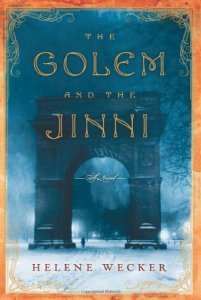
The Golem and the Jinni, by Helene Wecker
Synopsis: An unlikely love story in turn-of-the-century New York.
Book Review: This is a solid story about two fish-out-water characters who come to rely on each other in a strange world. It hooks you early with a fairy-tale style, then builds slowly, establishing all the major characters firmly before it brings them together. The more you read this book the more you want to keep reading it, but it never feels unbearably urgent. It is an altogether pleasant read, it wraps up everything well, and it features strong characterization and an interesting plot. While all this is good, it’s not entirely enthralling either. If this was all there was to the book I’m not sure I’d recommend it. I don’t have a ton of free reading time, and simply being good isn’t quite enough IMHO.
Fortunately, there is more. The Jinni is a fire elemental, with exactly the personality to match (passionate, flighty, irresponsible); whereas the Golem is an earth elemental with the matching characteristics as well (solid, dependable, conservative). At first one thinks this is simply good writing, but the more I read the more I became convinced that these two characters represent the male and female genders and the book is about gender relations and the chains of biology in a pre-reproductive-control society. The men can be reckless, they do not have to suffer the consequences of their actions. This allows them freedom to pursue their whims and passions. The Jinni does what he wishes, often carelessly destroying lives without knowing he’s doing it, without a care in the world. He is unconcerned with the trouble he could bring to his immigrant community, he doesn’t understand concepts like limiting yourself out of concern for the unfair ways the world may punish others. He behaves as if the world is fair, because he’s never the brunt of any injustice. The women, OTOH, must bear the fallout of men’s bad choices. They are expected to be always restraining the men, and always policing their own actions, because it’s their lives that are ruined by a mutual decision. And society reinforces this, doubling down on the pressure put on women and freeing the men, in a sick game of piling-on.
It’s a very effective metaphor in multiple ways. The Golem starts out the property of a man. Her father-figure tries to find a kind, new master for her when the first man dies. Her destiny is always to be bound to a man. Interestingly, she even desires this – when she’s free she’s uncomfortable. And even while she’s free she’s always serving others, and always tailoring her actions to comfort and appease those around her. Both out of desire and out of fear. The claustrophobic feeling of being a woman in an institutionally sexist society is palpable.
It isn’t all roses for the Jinni either. When he’s wounded and his fellow Jinni arrive he’s very concerned about hiding his weakness, which is an aspect of male culture you don’t see engaged very often – the constant fear of showing any weakness and always having to project a strong front can be very isolating. Particularly when you actually need help.
This aspect of the book increases my enjoyment of it a good deal, so yes, Recommended.
Book Club Review: Not surprisingly, this book makes for some fairly good talking. In addition to the gender themes there is some commentary on both religion and free-will/determinism which allows for further discussion. Plus portrayal of immigrant culture and ghettos in the early 1900s. Combined with the book’s natural charms and a very comfortable length, it is likely this will get a good percentage read-completion and involvement from everyone attending. Again, Recommended.